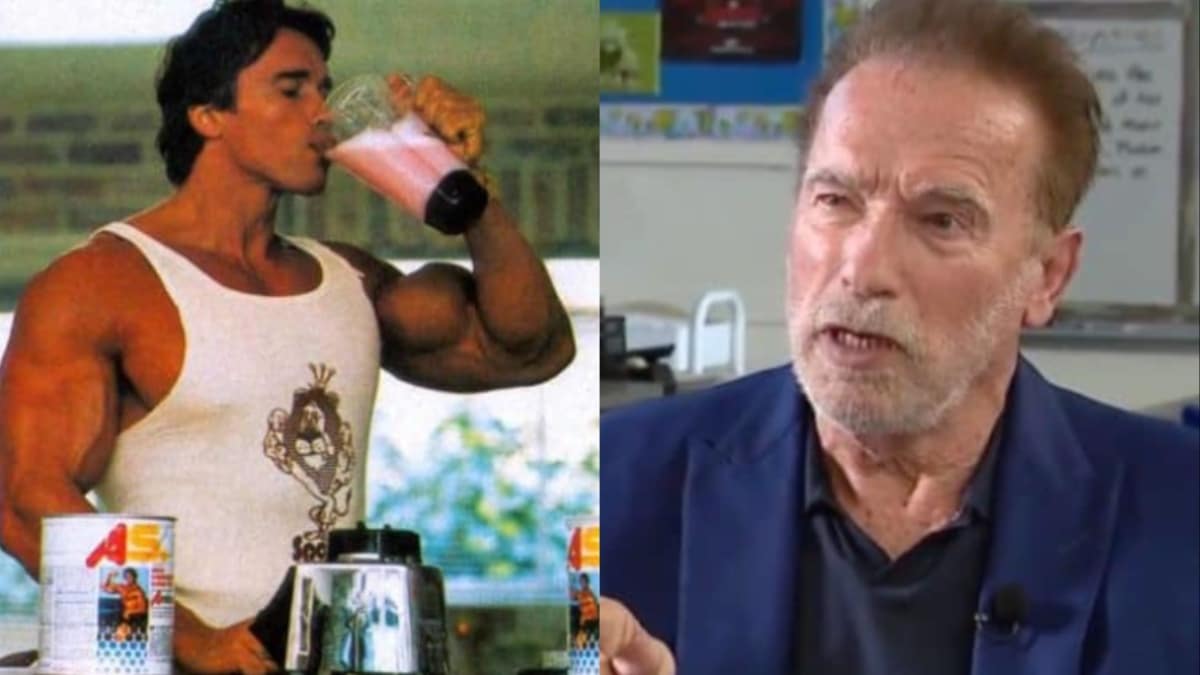
Bodybuilding legend Arnold Schwarzenegger’s attention to nutrition and dieting remain top priorities at the age of 76. In the latest Arnold’s Pump Club Newsletter, Schwarzenegger discussed protein intake and whether or not quality matters when choosing which sources to consume.
Given his star power and name recognition, fans listen when Arnold Schwarzenegger talks about his nutritional options. Having dominated the most prestigious stages in the sport, Schwarzenegger is no stranger to the protein demands of a top-tier bodybuilder. He’s a seven-time Mr. Olympia winner, a reign he made possible with popping biceps, a slim waist, and towering height.
In retirement, Schwarzenegger admits his diet has changed drastically. In 2022, he credited an 80% plant-based diet he’s followed for the last five years. ‘The Austrian Oak’ was dealing with cholesterol issues, which eventually led him down this ‘green diet’ path. While he accepts animal-based protein sources have richer amino acid profiles, Schwarzenegger believes the diet he follows has helped improve his life.
Hoping to make fitness more mainstream, Arnold has used his newsletter to inform the masses. To shed more light on diet hacks, the bodybuilding icon went over a healthy checklist he uses to stay fit despite his hectic schedule. Now, he’s back to highlight the differences between eating protein for quality versus quantity.
Arnold Schwarzenegger Weighs Up Protein – Does Quality Matter?
According to the seven-time Mr. Olympia, if you’re eating enough protein, quality isn’t as important.
“The debate about protein superiority usually focuses on the speed of digestion, rate of absorption, amino acid content, or being “clean.” But all of these claims might be a distraction from what really matters.
New research suggests that if you’re eating enough protein, the quality isn’t as important as you’ve been led to believe.
Many people believe that if you want to grow muscle, you need a fast-absorbing protein with high digestibility. But there hasn’t been much research asking a more practical question — if you eat more protein, can you worry less about the quality?
However, he says for those who want to consume less protein, quality options are preferred due to their absorption qualities.
The new study — which reviewed existing protein research — found that the quantity of protein you consume determines the need for quality. In other words, if you want to eat less protein, it’s best to focus on more premium protein. But, if you prefer eating a higher protein diet, then it’s OK if you’re not always consuming the highest absorbing options.
This is because protein consists of amino acids, the building blocks of your cells and muscle. And you need essential amino acids because your body can’t make them. Low-quality proteins have fewer essential amino acids or can be missing some of them completely. And that’s why some proteins really are “better” than others.
Schwarzenegger shared that the body will compensate with amino acid ‘gaps’ if the person eats excessive protein daily, which is good news for bodybuilders, who must consume staggering amounts of protein to maintain their muscle mass.
“But if you eat more protein (a minimum of 1.6g/kg per day of protein, according to the research) — even if it’s not the best option — the quantity compensates for the lower quality, your body fills the amino acid gaps (assuming you’re eating a variety of protein sources), and your body gets what it needs to build muscle, help you recover, and support your overall health
Of course, there are other considerations when choosing protein. Calories still matter, so if selecting a “lower quality” protein source means loading up on unnecessary calories, that could impact your results. But the protein itself — as long as you eat enough — will not hold you back.
If you want some guidelines or count your macros, here’s a simple example to show how it works. Let’s say you’re 175 pounds. If you’re eating only high-quality options (such as whey, beef, egg, soy, or milk — all have high digestibility), you could see results with only 80 grams of protein per day. But, if you eat roughly 175 grams of protein daily, you can eat some lower-quality forms of protein such as peanuts, wheat, or beans.” Arnold Schwarzenegger shared in his newsletter.
Aside from his nutrition, Schwarzenegger continues to dedicate himself to training but he’s also eager to help others discover fitness. In a recent collaboration with fellow FUBAR actors Bert Kreischer and Fortune Feimster, Schwarzenegger turned back the clock pumping iron and offered tips on maximizing contractions during each movement.
RELATED: Arnold Schwarzenegger Unveils His 3-Tier ‘Hierarchy of Muscle Gains’
Schwarzenegger believes adequate protein consumption is critical to a happy, healthy, and fit lifestyle. Regardless of its quality, “it will not hold you back.”
